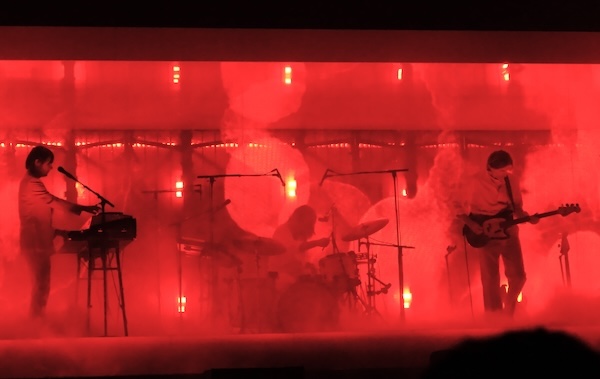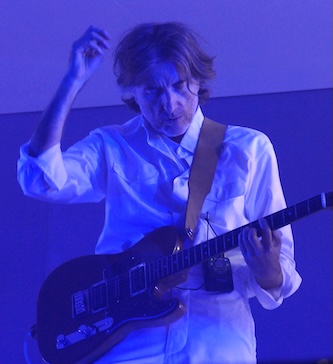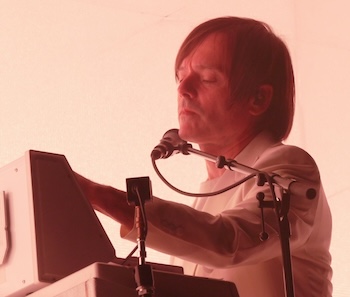Concert Review: Air’s Electro-Pop — In a Subdued Mood
By Paul Robicheau
Most of the night’s visually tilted action took place within a tightly framed stage that made the presentation seem somewhat detached. Fans might have imagined they were watching a film, at least from a straight-on view. Yet, from other angles, Air’s show looked like a museum diorama of a late 1990s synth-rock band that came to life.

Air at MGM Music Hall at Fenway. Photo: Paul Robicheau
Las Vegas has a huge multimedia dome, Sphere, to wrap bands in visual eye-candy that scales a virtual sky. French electro-pop duo Air doesn’t have that level of popularity or budget, even though it played the closing ceremonies of the Paris Olympics. So, in its first Boston show in seven years at MGM Music Hall at Fenway this week, Air packed its audiovisual act in a compact box.
Air pilots Jean-Benoit Dunckel (keyboards) and Nicolas Godin (bass, guitars, and keyboards) flanked drummer Louis Delorme in an open-front rectangular prism the size of a large living room, its glassy walls and low ceiling reflecting oblique projections and lighting effects.
Sound and vision go together for Air, a band inspired by both Pink Floyd and Kraftwerk, who presaged the millennial electronica of Radiohead and Tame Impala. The group’s 1998 debut Moon Safari became a stylish landmark, with its spacey, minimalist layers of sleek synthesizers and danceable pulsations.

Nicolas Godin of Air at MGM Music Hall at Fenway. Photo: Paul Robicheau
As such, the album’s 25th anniversary provided the band with a good excuse to perform the album in its entirety on tour. Despite that hook, MGM was far from sold out for Tuesday’s pricey show (even the top balcony was closed). But the theater-styled venue — with chairs on the floor — offered a near-perfect environment for fans to soak in the experience.
Moon Safari comprised the first half of the group’s 90-minute set, which started with the chill vibes of opener “La femme d’argent,” where Godin’s slinky bass lines underscored the echo pulses of Dunckel’s electronic keys. The hit “Sexy Boy” picked up the pace with Dunckel singing through a vocoder as the walls offered shifting views of the stars — plus, oddly, a moon-loving chimp.
“All I Need” dabbled in a vocal sample in place of Beth Hirsch’s singing on record. Then came the album’s purest confection, “Kelly Watch the Stars,” wound with swooping synths, throbbing bass, and hazy vocoder chorus.
But Moon Safari remains a front-loaded album. After “Kelly,” its songs largely faded into being the atmospheric soundtrack for the visuals. The MGM show offered the flip side to a usual Air set, which builds to that album’s opening favorites. Godin manned the vocoder mic to the cocktail click-rhythm of “You Make It Easy,” while fake fireworks sprayed inside the box and spotlights fanned over the top in rare illumination beyond the band’s framed space. The never-toured “Ce matin-là” floated a mellow mood: Dunckel’s Musak-ish Moog melody floated over Delorme’s light shuffle and there was a lonesome harmonica break from Godin.
After gliding through the album, the group took a break for only a few minutes (to bartenders’ likely dismay) to return for another 45 minutes of material from three later albums and, for all the Moon Safari buzz, the show picked back up.
The serene “Radial” bathed the silhouetted musicians in sunset orange, while the cuboid stage transformed into the bridge of a starship passing by planets for the chord-cycling “Venus.” At other times, the exoskeleton behind the box’s shiny back wall was exposed in a layered lighting effect, much like Sphere in Vegas.

Jean-Benoit Dunckel of Air at MGM Music Hall at Fenway. Photo: Paul Robicheau
Dunckel’s piano evoked Pink Floyd’s Dark Side of the Moon in “High School Lover” from Air’s soundtrack to Sofia Coppola’s The Virgin Suicides. And the band nodded to Floyd’s 360-degree approach to sound in a visual way, ringing the floor with very sporadically pulsed lights hung from the mezzanine.
However, most of the night’s visually tilted action took place within a tightly framed stage that made the presentation seem somewhat detached. Fans might have imagined they were watching a film, at least from a straight-on view. Yet from other angles, particularly close to the stage, it looked like a museum diorama of a late 1990s synth-rock band that came to life.
As such, the music finally hit an upbeat jam in second-set closer “Don’t Be Light,” which also flashed its title in bold illumination. Before that, the group seemed more subdued than in the past, leaning into the soundtrack role.
After the pleasant trifle “Alone in Kyoto,” with an acoustic guitar melody and vibes-like drum pads, the encore ended on another more emphatic note. “We are electronic performers,” Godin sang in a futuristically treated voice, sort of like Captain Obvious. Yet Delorme, who mostly played flat-toned acoustic drums through the show with a light touch, laid into final fills on his kit. And when the players exited the box to take their last bows, with Delorme tossing drumsticks into the crowd like it was a normal rock show, the literal fourth wall was broken and the band’s heart grew more evident, freed from a visual cage.
Paul Robicheau served more than 20 years as contributing editor for music at the Improper Bostonian in addition to writing and photography for the Boston Globe, Rolling Stone, and many other publications. He was also the founding arts editor of Boston Metro.
Tagged: "Moon Safari", Air, electro-pop, Jean-Benoit Dunckel, Louis Delorme

